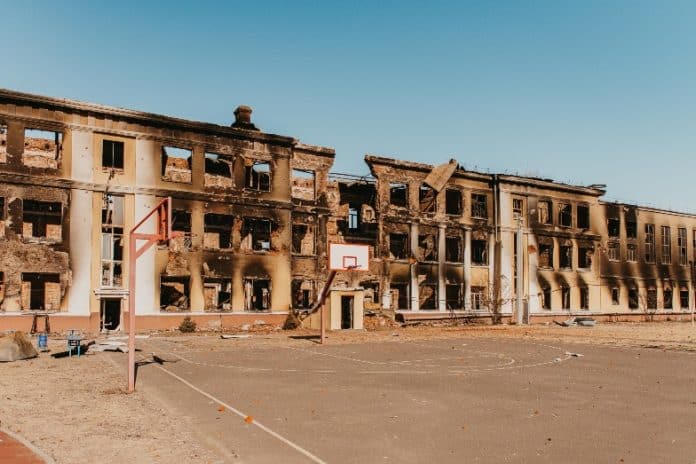War crimes, crimes against humanity, genocide, ethnic cleansing: what do these international justice terms mean?
What are war crimes?
War crimes are violations of international humanitarian law (whose perpetrators incur individual criminal responsibility under international law).
Consequently, unlike the crimes of genocide and crimes against humanity, war crimes always take place in the context of an armed conflict, whether international or not.
War crimes include murder, torture, pillage, or intentionally directing attacks against the civilian population, humanitarian aid workers, religious and educational buildings and hospitals. The use of weapons not authorised by international conventions, such as chemical weapons or cluster munitions, can also be considered a war crime.
Unlike genocide and crimes against humanity, war crimes can be perpetrated against a variety of victims, whether combatants or non-combatants, depending on the type of crime.
Who judges war crimes?
National courts generally must judge the perpetrators of war crimes. However, this may not be possible during or after the conflict.
Other institutions have jurisdiction in such cases: international, mixed and hybrid tribunals and the International Criminal Court.
Under the Geneva Conventions, perpetrators of war crimes must also be tried in countries other than those in which the crimes were committed, in application of the principle of universal jurisdiction.
What is a crime against humanity?
Crimes against humanity are crimes committed as part of a widespread attack directed against any civilian population, such as murder, extermination, enslavement, torture, rape, or any form of sexual violence or sexual slavery.
Crimes against humanity need not be linked to armed conflict and can also occur in times of peace, as can the crime of genocide. They must comprise three elements:
Physical: it must be one of the following acts: murder, extermination, enslavement, deportation or forcible transfer of population, imprisonment, torture, grave forms of sexual violence, persecution, enforced disappearance of persons, apartheid crime or other inhumane acts.
Contextual: the act must have been committed as part of a widespread or systematic attack against any civilian population.
Mental: “with knowledge of the attack”. From a contextual point of view, crimes against humanity involve either large-scale violence or a methodical (systematic) form of violence.
Unlike genocide, crimes against humanity do not necessarily target a specific population group. They can, therefore, be directed against any civilian population.
Who judges crimes against humanity?
The ICC is the only permanent court responsible for punishing crimes against humanity, apart from national criminal courts for states that have made crimes against humanity part of their criminal law.
What is genocide?
Unlike war crimes, genocide can be committed in the context of a peaceful situation, although this is not a common occurrence. Genocide requires two elements:
The mental element: an “intent to destroy in whole or in part a national, ethnic, racial or religious group as such”.
And the following five physical elements:
- Killing members of the group
- Causing serious bodily or mental harm to members of the group
- Deliberately inflicting on the group conditions of life calculated to bring about its physical destruction in whole or in part
- Imposing measures intended to prevent births within the group
- Forcibly transferring children of the group to another group
Establishing the intent to physically destroy a national, ethnic, racial or religious group, which must be demonstrated for genocide to occur, is a highly complex matter. Further information is available on the Office on Genocide Prevention and the Responsibility to Protect website.
Who judges genocide?
At first, genocide was punished by ad hoc tribunals; then the UN recognised the “universal jurisdiction” of national courts to prosecute any act of genocide wherever it took place while creating a specialised international body, the ICC.
Trials under this so-called “universal jurisdiction” have taken place in Belgium, Switzerland and Canada for crimes of genocide in Rwanda and in the Netherlands for the gassing of an Iraqi village.
What is ethnic cleansing?
Ethnic cleansing is not recognised as an independent crime under international law. Although the term has been used in Security Council and General Assembly resolutions, it has not been defined in international law.
The term “ethnic cleansing” emerged during the conflict in the former Yugoslavia and was used by a United Nations commission of experts charged with examining violations of international humanitarian law committed on the territory of the former Yugoslavia.
In its report, the commission of experts described ethnic cleansing as “rendering an area ethnically homogeneous by using force or intimidation to remove persons of given groups from the area”.
It is “a purposeful policy designed by one ethnic or religious group to remove by violent and terror-inspiring means the civilian populations of another ethnic or religious group from certain geographical areas”.
According to this commission, these practices could constitute crimes against humanity as well as well-defined war crimes. They may also fall within the scope of the Genocide Convention.
See also:
- What can the UN do in the face of war?
- Humanitarian aid: the UN mobilises for the Ukrainians
- The UN and the crisis in Gaza: What you need to know
- The UN and the war in Ukraine: key information
- Far from the Headlines: Sudan’s tragedy continues

